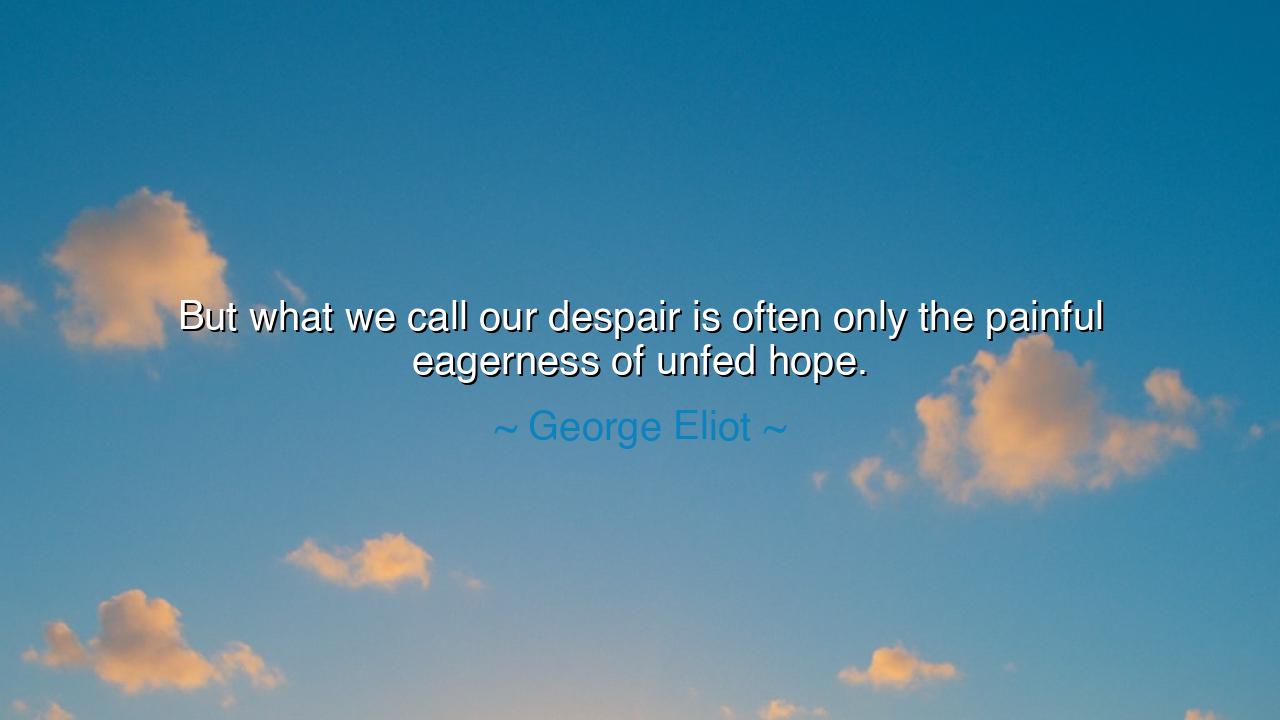
But what we call our despair is often only the painful eagerness






“But what we call our despair is often only the painful eagerness of unfed hope.” – George Eliot
There are words that shine like hidden gems beneath centuries of dust—simple, yet filled with quiet power. This saying by George Eliot, the wise soul of English letters, is one such jewel. In it lies a truth that reaches into the depths of the human heart: that despair is not always the death of hope, but its hunger. What we name hopelessness is often the ache of a hope that still lives within us, crying out to be nourished. The pain we feel in our darkest hours is not the absence of light—it is the yearning of our spirit for light unseen.
George Eliot, whose true name was Mary Ann Evans, lived in an age when the soul of man wrestled with doubt. The faith of old was fading, and the iron world of reason and industry left many hearts hollow. Yet in her works, she sought not to destroy belief, but to reveal its truer form—the faith born not of creed, but of compassion and endurance. When she wrote, “What we call our despair is often only the painful eagerness of unfed hope,” she spoke as one who had tasted sorrow and still chosen love. She understood that within every cry of despair, there beats a secret longing for renewal—a hope starved but not dead.
Consider the tale of Abraham Lincoln, who in his youth was struck by poverty, loss, and failure so deep that he once feared for his sanity. His life seemed filled with despair—his sweetheart dead, his ambitions broken, his soul weary. Yet within him burned a restless eagerness, a belief that life could yet hold meaning. That longing, painful though it was, became the root of his greatness. For when hope is unfed, it aches; but when it is fed with purpose and perseverance, it grows into destiny. Thus Lincoln rose from grief to become a light in one of the darkest hours of human history, freeing millions and healing a divided land. His despair was never death—it was the hunger of hope unfulfilled, waiting to be fed.
So too in our own hearts, the times we feel most lost are often the times our hope is most alive, though hidden beneath the weight of pain. The one who despairs of love only does so because he has not stopped believing in it; the one who laments injustice still yearns for righteousness. If we truly had no hope, we would feel nothing. Despair is not emptiness—it is the cry of the soul for what it still believes might be possible. It is the proof that we were made for something more.
The ancients knew this truth. The Greeks spoke of Pandora’s box, from which all the world’s evils were unleashed—sickness, sorrow, envy, death. Yet at the bottom of that box remained Hope, small and shining, the last and greatest gift. Even in ruin, the divine left us this one treasure. Eliot’s wisdom echoes that ancient myth: that even when despair seems to rule, hope remains, waiting only to be fed by courage, by kindness, by belief in the unseen good.
O seekers of wisdom, take this lesson to heart: when you are weary and feel that life has abandoned you, listen to the voice beneath your sorrow. Ask not, “Why do I despair?” but “What hope within me is starving?” Feed it—with small acts of love, with patience in the unseen, with the remembrance that life turns like the seasons and that no winter lasts forever. The heart that dares to nurture even a flicker of faith will see spring return.
The lesson is eternal: what we call despair is but the shadow cast by hope when the sun has set for a while. Do not mistake that shadow for the end. Light the fire of hope within you with gratitude, action, and trust. When your soul hungers, do not feed it with bitterness, but with purpose and kindness. For the day you learn to see hope within despair, you will have found the secret of all endurance, and the strength to transform sorrow into growth, and pain into rebirth.






AAdministratorAdministrator
Welcome, honored guests. Please leave a comment, we will respond soon